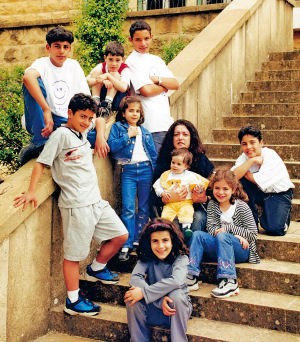Child Sponsorship Background from Beirut, Lebanon
 SOS Children's Village Bhersaf, near Beirut
SOS Children's Village Bhersaf, near Beirut
In the immediate vicinity of the small town of Bikfaya, the Village Bhersaf stretches out along the winding mountain road, at an altitude of about 1000 metres above sea level. Pine woods surround the SOS Children's Village, which is built on the slope of the hill and enjoys impressive views of the sea, the coastal towns and Beyrouth.
The SOS Children's Village consists of twelve family houses, the Village Director's house, housing for the SOS aunts, who take care of SOS children during the absence of SOS mothers, administrative and service areas, 5 workshops, a theatre, and a shelter and living quarters for retired SOS mothers. During their leisure time, children may use the handicrafts room, the library, the sports field or the playground for all kinds of activities. There is a sufficient number of schools in the vicinity which enables all children to take classes near their homes.Other SOS Projects in Bhersaf
As soon as youths reach the age of 14 or 15, they move to the SOS Youth Homes in Beyrouth. Being admitted to an SOS Youth Home is synonymous to the beginning of their independence. SOS mothers, the Village Director and a psychologist prepare them carefully for that change. Usually, youths stay up to four years in an SOS Youth Facility. They may stay longer, however, if they go on to study at a university.
While the 25-year-long Civil War was still raging in Lebanon, in 1986, the SOS Social Centre Mkallès was founded by the Lebanese SOS Children’s Village Association. It is located in an eastern suburb of Beyrouth, on the fourth floor of a big apartment building. The misery suffered by a great number of half-orphaned children worsened during the Civil War in Lebanon and the resulting economic crisis was decisive for the foundation of the SOS Social Centre.
The SOS Social Centre consists of workshops, an exposition hall and a warehouse, and office rooms for social workers. In the workshops, widowed mothers produce different kinds of handicrafts such as Lebanese puppets, tablecloths, towels and pillows. These women, who have to fend for their families on their own, learn ways of supporting their families in the workshops. Expositions are regularly held during which the handicrafts may be sold. In addition, they are put up for sale in the SOS shop in Sin El Fil and numerous other shops in the area.
The second part of the SOS Social Centre Mkallès consists of three office rooms for social workers. The families who are taken care of by the SOS Social Centre mainly come from the suburbs of Beyrouth but also from northern Lebanon/Kfarhay and southern Lebanon/Chouf. The families are granted support for a period of two to three years. This support primarily aims at enabling these women to learn a trade or to help them to reintegrate into the work market as seamstresses, hair-makers, etc., thus enabling again them to provide for their families. In addition, medical care and school fees for children are covered by the SOS Social Centre. About 130 to 140 families get support from the SOS Social Centre every year. The kind of support the families get varies according to their needs. The support provided by the SOS Social Centre is considered a success as soon as the families have become financially and socially independent.
Background to Beirut
Beirut is the capital and largest city of Lebanon with a population ranging from some 1 million to over 2 million as of 2007. Located on a peninsula at the midpoint of Lebanon's coastline with the Mediterranean sea, it serves as the country's largest and main seaport, and also forms the Beirut Metropolitan Area, which consists of the city and its suburbs.

 Return to Schools Wikipedia Home page…
Return to Schools Wikipedia Home page…
